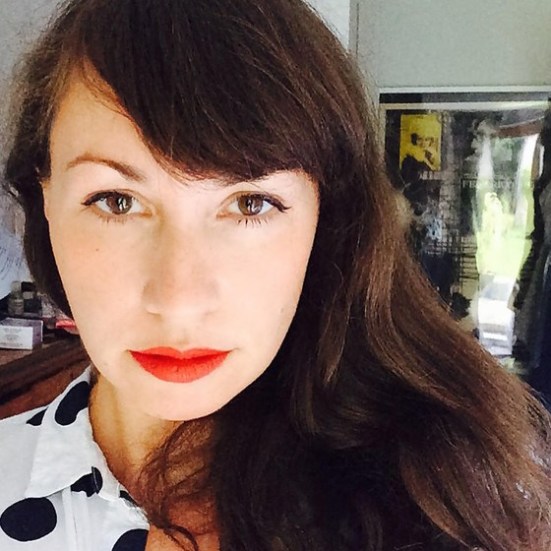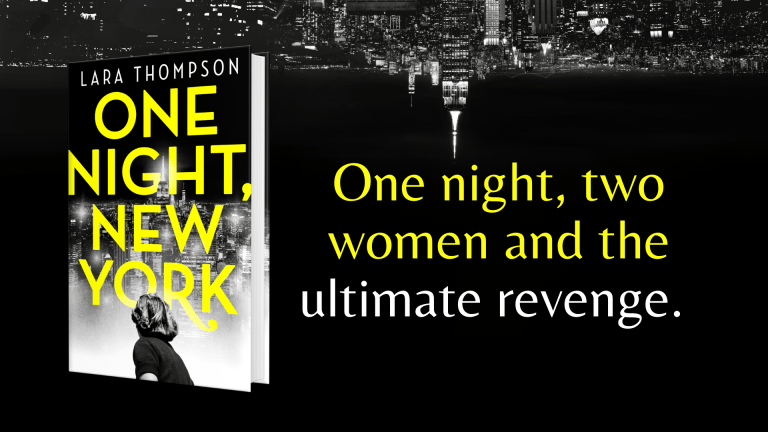Meet the winner of Virago/The Pool’s New Crime Writer Award

Meet the winner of Virago/The Pool’s New Crime Writer Award
And read an extract from the 1930s Manhattan-set detective story that won lecturer Lara Thompson a book deal

Lily Peschardt – originally published on The Pool.
We are delighted to announce that Virago and The Pool’s New Crime Writer Award is Lara Thompson for her debut novel, One Night, New York.
Chosen from over 200 entries, Thompson’s novel is set in 1930s New York and opens with Frances and Agnes waiting at the top of the Empire State Building to seek revenge on a man who has torn apart both of their lives. Set over the course of a single night, with flashbacks to the events that drove them to contemplate murder, One Night, New York is a detective story, a romance and a coming-of-age tale.
Thompson, a film lecturer at Middlesex University, couldn’t believe it when she got the email from Sarah Savitt, publisher of Virago, telling her she’d won.
“When I saw the first line of the email and it said something like ‘We are delighted’, I had a weird hot flush, like I suddenly entered the menopause. I didn’t even open the email because I was too flustered. I called my husband and he was like, ‘Have you actually read the email?’”
So, Thompson read the email. And then she read it again. “I had to read it about 20 times to really believe that it was happening. I have a child and a husband and this is the most exciting thing that’s ever happened,” she insists. “I never win anything.”
“Writing was always something I did in my spare time, but never engaged with fully because I didn’t have the time or the money”
While her friends and family knew that Thompson loved academic writing, they were surprised when she told them she was entering a crime-fiction competition: “I’ve been doing it in secret, or almost in secret. When I told my best friend I was entering, she had no idea that I even wrote fiction.”
I love writing in all genres, but I’ve always wanted to be a novelist – I just didn’t know how to do that,” Thompson says. Her husband suggested she took a writing class at City Lit and Thompson loved the classes; in fact, One Night, New York grew out of some of the exercises she learnt on the course. “They get you to do assignments each week on different things like dialogue or imagery.”
Thompson was inspired to write this story after seeing Berenice Abbott’s photography of 1930s New York. Something about Abbott’s life resonated with Thompson: “She used to climb up the sides of skyscrapers and take photos from the top. She used to bribe security guards to get to the top.”
But there was one specific photograph that really caught Thompson’s imagination: “It’s called Night Scene, New York and it’s taken from the top of the Empire State Building in 1932 on the December solstice, just after electricity had been installed in New York.”
Thompson started thinking about this period of history: “There was enormous poverty in New York and at the same time they’re building these huge skyscrapers,” she explains. While she was fascinated by Bernice Abbott’s story, Thompson knew she didn’t want to write historical fiction, so instead she worked a story around it, using Bernice Abbott’s life as a jumping-off point. She started wondering what other reason someone might have for being at the top of the Empire State Building: “I knew since the building opened there had been a history of suicides and that’s how the seed of the story began.”
While Thompson has always dreamed of being a novelist, real life kept getting in the way. “Writing was always something I did in my spare time, but never engaged with fully because I didn’t have the time or the money,” she explains.
But winning this competition, which provides Thompson with a publishing contract with the iconic publisher, Virago, and two hours of mentoring from acclaimed novelist Jill Dawson, finally gives her the opportunity to realise her dream.

READ THE OPENER THAT HOOKED THE JUDGES…
New York City
Winter solstice, December 20th, 1932
4-5pm
Frances blinked slowly, capturing the illuminated city one moment at a time. Her initial shock at the height had faded, but if she moved close to the edge, if she tipped her head over the waist-height balustrade, the hysterical sensation returned. A few months ago she would have been terrified. Tonight she was captivated. All around skyscrapers seemed to grow and thrust, dwarfing the miniature tenements at their feet. Fog clung to the tips of the highest towers. Snatches of street-level noise sailed up – blasting car horns, workmen shouting on their way home, swing bands tuning up in the ritzy joints on Broadway. She could see why people jumped. The city seduced from up here, as though instead of dying on the fresh asphalt, you might leap right into the electric heart of life itself. She bent forward, vertigo swelling. It was impossible to see them from here, but she could imagine the doomed washing lines criss-crossing her crumbling street, hundreds of feet below. Soon they’d be torn down, two-weeks’ notice: she wondered where everyone would hang their clothes.
The wind tugged and pulled, threatening to push her off with violent, icy shoves. She wrapped Stan’s overcoat around her more tightly, glad she had brought it, comforted by the sharp sensation that her own arms were his. Leaning her head to one side, touching her chin to the rough grey wool, she imagined it was his shoulder. The smell of his Luckies was burnt into the fabric. Frances sucked in the fading fumes, wishing with each breath that she could smell the smoke fresh from his mouth again, wracked by the awful truth that she never would, and shook – a lone, vibrating silhouette on the highest stones of the city. For the hundredth time since they’d made their promise, she wondered if she and Agnes were really going to go through with it, if she was brave and terrible enough, until a sudden gust almost stole her hat and she only just caught it, struggling with leaden fingers to pull out the pins as it twisted and strained. Free at last, her hair whipped her eyes. Tears fell. She hoped she’d feel better once they’d done it, she couldn’t bear the thought of this sadness sticking to her forever. Agnes had looked at her strangely when she’d suggested they both might feel more normal afterwards. She’d gotten this faraway look in her eyes and told Frances that that wasn’t the point. Then she’d gazed at the embers in the grate and said she didn’t know how they would feel but that either way it was the right thing to do. That was all that ever mattered to Agnes. Doing the right thing.
She could see why people jumped. The city seduced from up here, as though instead of dying on the fresh asphalt, you might leap right into the electric heart of life itself
Frances shivered, thrust the felt deep into Stan’s pocket, creases be damned, and turned, ears hollowed by the wind, breath caught, determined to take it all in. If this was the first and last time she was going to see her city from up here, if tonight was everything, then she had to commit it to memory. She must stain her mind with the sight of it. Beneath her the city flashed and sighed, revolving and expanding, new lights stretching the city limits as dusk fell. From up here it looked as though the dimming sky had been stripped from the heavens and ironed flat: a thousand lit windows scattered like sequins on the dress of the night.
Agnes called to her from inside. Finally. She had said it would only take forty-five minutes. Fifteen to set up, fifteen for the exposure, fifteen to get the hell out. They’d already been up here an hour and Frances was getting all balled up. He should have been here by now.
“Did you bring it?” Agnes called again.
“Yes,” she shouted, pushing the word away before the wind could throw it back. And yet still she didn’t move. One last look. She wished she had a smoke to mark the occasion. Undoing the button on Stan’s other pocket, she pushed her hand in, rooting around just in case. Her fingers trembled as they brushed against damp cotton, loose matchsticks and a few mucky dimes. Finally, she caught hold of something. It wasn’t a ciggy, it was the note. She pulled it out, fumbling in the cold. Whatever happened she mustn’t let it go. Not in this wind, not up here. It was only a few lines, but she and Agnes had spent so long agonising over the words. The right tone. The most convincing lie. Without it no-one would believe them. As soon as that filthy hood arrived, they’d persuade him onto the balcony. Frances would distract him so Agnes could press the note into his breast pocket. Then they’d both shove him over the edge with all their might.




